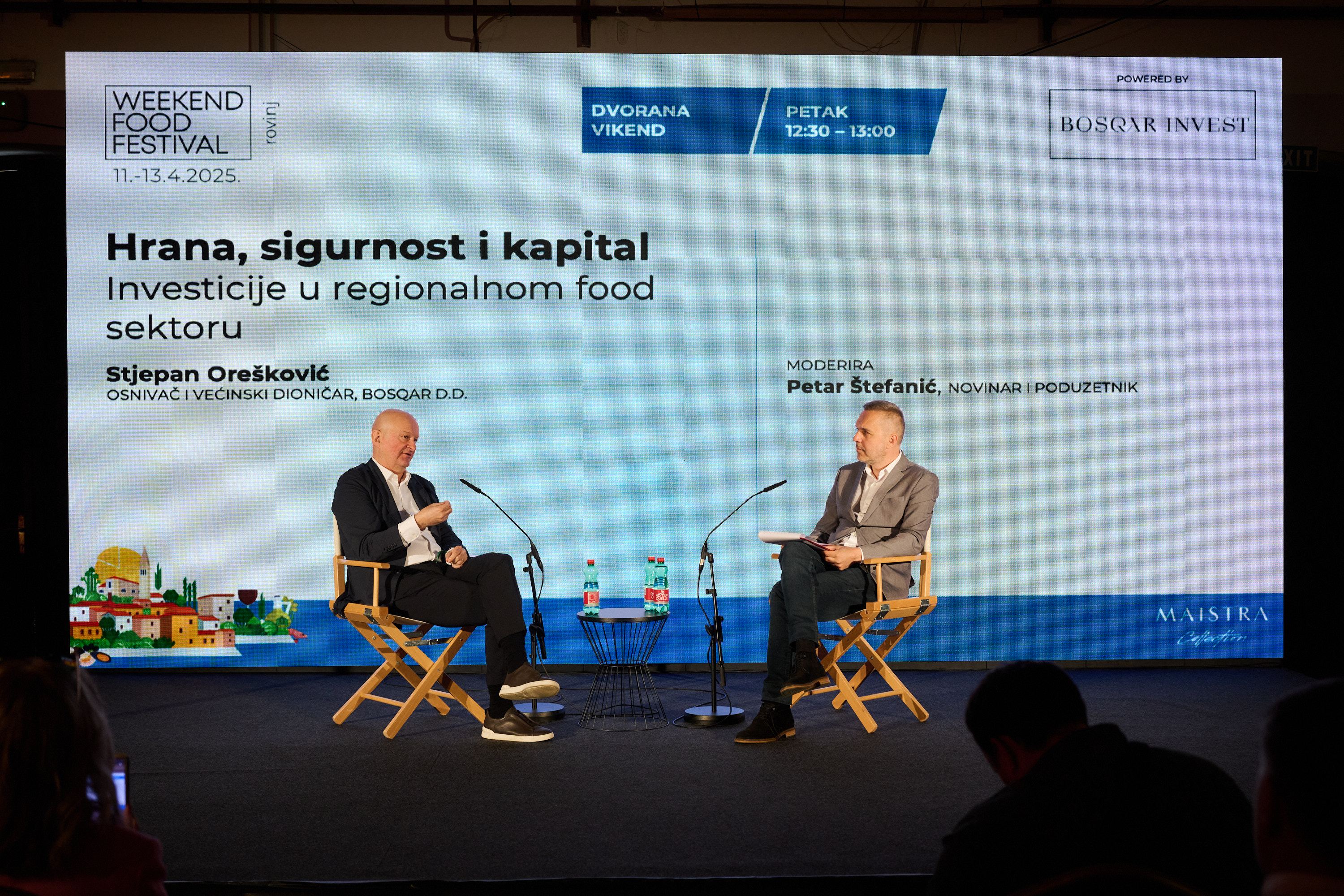Rovinj, Croatia, April 11, 2025 – At this year’s Weekend Food Festival, BOSQAR d.d. founder and majority shareholder Stjepan Orešković took the stage during the panel “Food, Security and Capital,” offering insights into how investment, geopolitics, and strategy intersect to shape food systems across Central and Eastern Europe.
Held at the Old Tobacco Factory and moderated by journalist Petar Štefanić, the panel explored how capital can be mobilized to strengthen regional food resilience amid growing global volatility.
Grounding Investment in Trust and Instinct
Orešković opened by sharing what truly drives BOSQAR’s investment decisions – far from theoretical models or trend-following, it’s about relationships and lived experience.
“There are always plenty of reasons to invest. Big investment banks often ask our team about our plans and how we make decisions. People like to exaggerate when explaining their own history. But for us, the truth is quite simple – we’ve never done anything outside the circle of people we trust. Our projects always stem from our social capital – the people we know and believe in.”
He emphasized that while BOSQAR applies traditional investment discipline - balancing risk levels, technologies, and margin profiles – there’s always room for human instinct and adaptability.
“Every sound portfolio needs diversification but when I look back at the decisions that shaped us, the constant has been trust. In our people and in our partners.”

Investing in Legacy and Local Strength
This approach was exemplified by BOSQAR INVEST’s recent investment in Panvita Group, one of Slovenia’s oldest food companies and a pivotal move in BOSQAR’s expansion into the food sector.
“Panvita represents everything we believe in. It’s over 100 years old, rooted in Slovenia’s Prekmurje region, where people have a deep work ethic and a sense of community. Our partners, the Polanič family, are outstanding. We don’t enter companies with the intention to dominate – we enter to build long-term partnerships with smart, capable people.”
Orešković also highlighted the vast, often overlooked potential of Croatia and the wider region.
“Croatia has immense potential in food. When you assess the state of agriculture, you see a lot of inefficiencies – our productivity is at 40% of the EU average. That’s not a weakness; it’s an opportunity. When you look to acquire a company, you don’t want it perfect – you want something good that you can turn great.”
Food as a Strategic Asset
He also underscored the strategic importance of food as a national and regional priority.
“If you don’t have control over water, food, and the things that keep you alive, you’re vulnerable. Food sovereignty is fundamental. Some call it food sovereignty, and they’re right.”
Orešković also explained that BOSQAR’s roadmap in the food sector combines organic growth and strategic acquisitions.
“No company became globally relevant without mastering both. If you can’t grow organically, you won’t know how to manage acquisitions. And if you rely only on organic growth, you’ll always be a fraction of what you could be.”

A Belief in Science and People
Beyond economics, he took a firm stance on science and evidence-based leadership.
“Some are suddenly cautious about ESG because the mood has changed. But we believe in science. The question is - do you live by what science tells us, or just talk about it? The same goes for gender equity. I’ve been a professor long enough to see the shift from 75% male to 75% female students. If your leadership isn’t near 50/50, you’re giving up on a huge pool of talent.”
Balancing Experience and Youth
Turning to BOSQAR’s internal structure, Orešković described a dynamic interplay between generations.
“In our group, we have it all - different roles, different ages. I don’t get involved in day-to-day operations. That’s led by our talented team – many of them are in their 30s. They bring energy, intelligence, and courage. I bring the experience – the bruises, the lessons learned.”
On Mistakes, Partnerships, and Leadership
Asked about lessons learned, Orešković emphasized the value - and fragility - of good partnerships.
“The best lesson I’ve learned? Don’t give advice unless someone asks for it. In business, partnerships are everything. If something feels wrong, walk away – don’t worry about the cost. If you're in a company worth X and give the wrong partner a share, you've given away something priceless. But when you find the right partner, never let go – no matter what.”





.jpg)